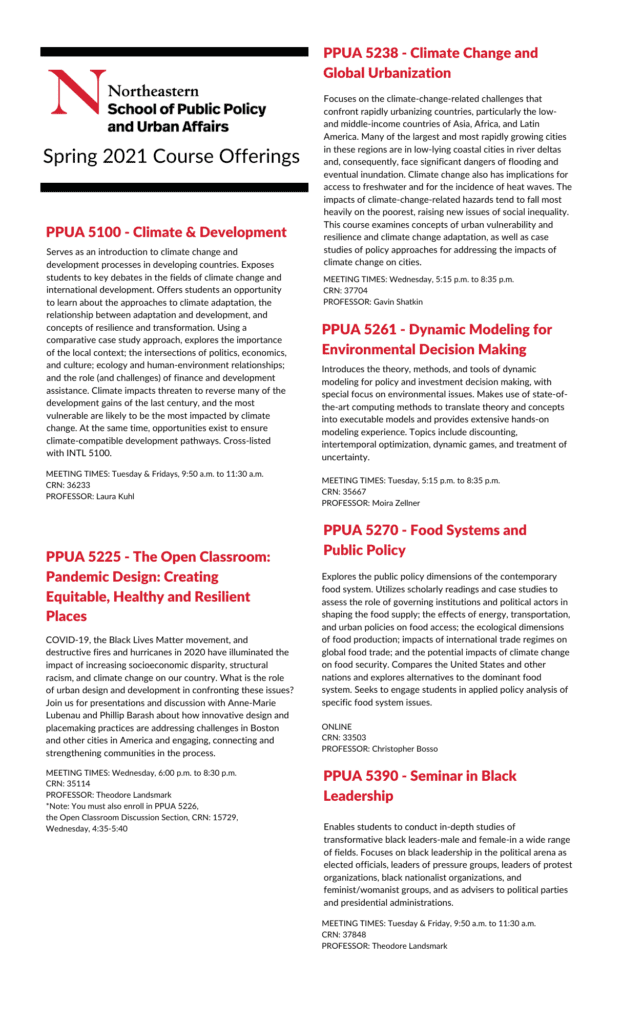The School of Public Policy and Urban Affairs offers a variety of 5000-level courses for undergrad students at Northeastern University. Because of policy's interdisciplinary importance, we welcome students with an array of interests.
Graduate Course Catalog
Serves as an introduction to climate change and development processes in developing countries. Exposes students to key debates in the fields of climate change and international development. Offers students an opportunity to learn about the approaches to climate adaptation, the relationship between adaptation and development, and concepts of resilience and transformation. Using a comparative case study approach, explores the importance of the local context; the intersections of politics, economics, and culture; ecology and human-environment relationships; and the role (and challenges) of finance and development assistance. Climate impacts threaten to reverse many of the development gains of the last century, and the most vulnerable are likely to be the most impacted by climate change. At the same time, opportunities exist to ensure climate-compatible development pathways. Cross-listed with INTL 5100.
COVID-19, the Black Lives Matter movement, and destructive fires and hurricanes in 2020 have illuminated the impact of increasing socioeconomic disparity, structural racism, and climate change on our country. What is the role of urban design and development in confronting these issues? Join us for presentations and discussion with Anne-Marie Lubenau and Phillip Barash about how innovative design and placemaking practices are addressing challenges in Boston and other cities in America and engaging, connecting and strengthening communities in the process.
Focuses on the climate-change-related challenges that confront rapidly urbanizing countries, particularly the low- and middle-income countries of Asia, Africa, and Latin America. Many of the largest and most rapidly growing cities in these regions are in low-lying coastal cities in river deltas and, consequently, face significant dangers of flooding and eventual inundation. Climate change also has implications for access to freshwater and for the incidence of heat waves. The impacts of climate-change-related hazards tend to fall most heavily on the poorest, raising new issues of social inequality. This course examines concepts of urban vulnerability and resilience and climate change adaptation, as well as case studies of policy approaches for addressing the impacts of climate change on cities.
Introduces the theory, methods, and tools of dynamic modeling for policy and investment decision making, with special focus on environmental issues. Makes use of state-of-the-art computing methods to translate theory and concepts into executable models and provides extensive hands-on modeling experience. Topics include discounting, intertemporal optimization, dynamic games, and treatment of uncertainty.
Explores the public policy dimensions of the contemporary food system. Utilizes scholarly readings and case studies to assess the role of governing institutions and political actors in shaping the food supply; the effects of energy, transportation, and urban policies on food access; the ecological dimensions of food production; impacts of international trade regimes on global food trade; and the potential impacts of climate change on food security. Compares the United States and other nations and explores alternatives to the dominant food system. Seeks to engage students in applied policy analysis of specific food system issues.
This course enables students to conduct in-depth studies of transformative black leaders, male and female, in a wide range of fields. Course material will focus on black leadership in the political arena as elected officials, leaders of pressure groups, leaders of protest organizations, black nationalist organizations, and feminist/womanist groups, and as advisers to political parties and presidential administrations.




